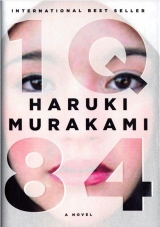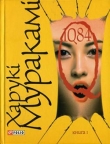
Текст книги "1q84"
Автор книги: Haruki Murakami
Жанр:
Современная проза
сообщить о нарушении
Текущая страница: 5 (всего у книги 81 страниц)
Fuka-Eri kept looking straight into Tengo’s eyes as if she were looking into an empty house with her face pressed up against the glass.
Tengo said, “When I’m writing a story, I use words to transform the surrounding scene into something more natural for me. In other words, I reconstruct it. That way, I can confirm without a doubt that this person known as ‘me’ exists in the world. This is a totally different process from steeping myself in the world of math.”
“You confirm that you exist,” Fuka-Eri said.
“I can’t say I’ve been one hundred percent successful at it,” Tengo said.
Fuka-Eri did not look convinced by Tengo’s explanation, but she said nothing more. She merely brought the glass of wine to her mouth and took soundless little sips as though drinking through a straw.
“If you ask me,” Tengo said, “you’re in effect doing the same thing. You transform the scenes you see into your own words and reconstruct them. And you confirm your own existence.”
Fuka-Eri’s hand that held her wineglass stopped moving. She thought about Tengo’s remark for a while, but again she offered no opinion.
“You gave shape to that process. In the form of the work you wrote,” Tengo added. “If the work succeeds in gaining many people’s approval and if they identify with it, then it becomes a literary work with objective value.”
Fuka-Eri gave her head a decisive shake. “I’m not interested in form.”
“You’re not interested in form,” Tengo said.
“Form has no meaning.”
“So then, why did you write the story and submit it for the new writers’ prize?”
She put down her wineglass. “I didn’t,” she said.
To calm himself, Tengo picked up his glass and took a drink of water. “You’re saying you didn’t submit it?”
Fuka-Eri nodded. “I didn’t send it in.”
“Well, who did?”
She gave a little shrug, then kept silent for a good fifteen seconds. Finally, she said, “It doesn’t matter.”
“It doesn’t matter,” Tengo repeated, emitting a long, slow breath from his pursed lips. Oh, great. Things really are not going to go smoothly. I knew it.
Several times, Tengo had formed personal relationships with his female cram school students, though always after they had left the school and entered universities, and it was always the girls who took the initiative. They would call and say they wanted to see him. The two of them would meet and go somewhere together. He had no idea what attracted them to him, but ultimately he was a bachelor, and they were no longer his students. He had no good reason to refuse when asked for a date.
Twice the dates had led to sex, but the relationships had eventually faded on their own. Tengo could not quite relax when he was with energetic young college girls. It was like playing with a kitten, fresh and fun at first, but tiring in the end. The girls, too, seemed disappointed to discover that in person, Tengo was not the same as the passionate young math lecturer they encountered in class. He could understand how they felt.
Tengo was able to relax when he was with older women. Not having to take the lead in everything seemed to lift a weight from his shoulders. And many older women liked him. Which is why, after having formed a relationship with a married woman ten years his senior a year ago, he had stopped dating any young girls. By meeting his older girlfriend in his apartment once a week, any desire (or need) he might have for a flesh-and-blood woman was pretty well satisfied. The rest of the week he spent shut up in his room alone, writing, reading, and listening to music; occasionally he would go for a swim in the neighborhood pool. Aside from a little chatting with his colleagues at the cram school, he hardly spoke with anyone. He was not especially dissatisfied with this life. Far from it: for him, it was close to ideal.
But this seventeen-year-old girl, Fuka-Eri, was different. The mere sight of her sent a violent shudder through him. It was the same feeling her photograph had given him when he first saw it, but in the living girl’s presence it was far stronger. This was not the pangs of love or sexual desire. A certain something, he felt, had managed to work its way in through a tiny opening and was trying to fill a blank space inside him. The void was not one that Fuka-Eri had made. It had always been there inside Tengo. She had merely managed to shine a special light on it.
“You’re not interested in writing fiction, and you didn’t enter the new writers’ competition,” Tengo said as if confirming what she had told him.
With her eyes locked on his, Fuka-Eri nodded in agreement. Then she gave a little shrug, as if shielding herself from a cold autumn blast.
“You don’t want to be a writer.” Tengo was shocked to hear himself asking a question without a question mark. The style was obviously contagious.
“No, I don’t,” Fuka-Eri said.
At that point their meal arrived—a large bowl of salad and a roll for Fuka-Eri, and seafood linguine for Tengo. Fuka-Eri used her fork to turn over several lettuce leaves, inspecting them as if they were imprinted with newspaper headlines.
“Well, somebody sent your Air Chrysalis to the publisher for the new writers’ competition. I found it when I was screening manuscripts.”
“Air Chrysalis,” Fuka-Eri said, narrowing her eyes.
“That’s the title of the novella you wrote,” Tengo said.
Fuka-Eri kept her eyes narrowed, saying nothing.
“That’s not the title you gave it?” Tengo asked with an uneasy twinge.
Fuka-Eri gave her head a tiny shake.
He began to feel confused again, but he decided not to pursue the question of the title. The important thing was to make some progress with the discussion at hand.
“Never mind, then. Anyway, it’s not a bad title. It has real atmosphere, and it’ll attract attention, make people wonder what it could possibly be about. Whoever thought of it, I have no problem with it as a title. I’m not sure about the distinction between ‘chrysalis’ and ‘cocoon,’ but that’s no big deal. What I’m trying to tell you is that the work really got to me, which is why I brought it to Mr. Komatsu. He liked it a lot, too, but he felt that the writing needed work if it was going to be a serious contender for the new writers’ prize. The style doesn’t quite measure up to the strength of the story, so what he wants to do is have it rewritten, not by you but by me. I haven’t decided whether I want to do it or not, and I haven’t given him my answer. I’m not sure it’s the right thing to do.”
Tengo broke off at that point to see Fuka-Eri’s reaction. There was no reaction.
“What I’d like to hear from you now is what you think of the idea of me rewriting Air Chrysalis instead of you. Even if I decided to do it, it couldn’t happen without your agreement and cooperation.”
Using her fingers, Fuka-Eri picked a cherry tomato out of her salad and ate it. Tengo stabbed a mussel with his fork and ate that.
“You can do it,” Fuka-Eri said simply. She picked up another tomato. “Fix it any way you like.”
“Don’t you think you should take a little more time to think it over? This is a pretty big decision.”
Fuka-Eri shook her head. No need.
“Now, supposing I rewrote your novella,” Tengo continued, “I would be careful not to change the story but just strengthen the style. This would probably involve some major changes. But finally, you are the author. It would remain a work by the seventeen-year-old girl named Fuka-Eri. That would not change. If it won the prize, you would get it. Just you. If it were published as a book, you would be the only author listed on the title page. We would be a team—the three of us, you, me, and Mr. Komatsu, the editor. But the only name on the book would be yours. He and I would stay in the background and not say a word, kind of like prop men in a play. Do you understand what I am telling you?”
Fuka-Eri brought a piece of celery to her mouth with her fork. “I understand,” she said with a nod.
“Air Chrysalis belongs entirely to you. It came out of you. I could never make it mine. I would be nothing but your technical helper, and you would have to keep that fact a complete secret. We’d be engaged in a conspiracy, in other words, to lie to the whole world. Any way you look at it, this is not an easy thing to do, to keep a secret locked up in your heart.”
“Whatever you say,” Fuka-Eri said.
Tengo pushed his mussel shells to the side of his plate and started to take a forkful of linguine but then reconsidered and stopped. Fuka-Eri picked up a piece of cucumber and bit it carefully, as if tasting something she had never seen before.
Fork in hand, Tengo said, “Let me ask you one more time. Are you sure you have no objection to my rewriting your story?”
“Do what you want,” Fuka-Eri said, when she had finished the cucumber.
“Any way I rewrite it is okay with you?”
“Okay.”
“Why is that?” he asked. “You don’t know a thing about me.”
Fuka-Eri gave a little shrug, saying nothing.
The two continued their meal wordlessly. Fuka-Eri gave her full concentration to her salad. Now and then she would butter a piece of bread, eat it, and reach for her wine. Tengo mechanically transported his linguine to his mouth and filled his mind with many possibilities.
Setting his fork down, he said, “You know, when Mr. Komatsu suggested this idea to me, I thought it was crazy, that there was no way it could work. I was planning to turn him down. But after I got home and thought about it for a while, I started to feel more and more that I wanted to give it a try. Ethical questions aside, I began to feel that I wanted to put my own stamp on the novella that you had written. It was—how to put this?—a totally natural, spontaneous desire.”
Or rather than a desire, hunger might be a better way to put it, Tengo added mentally. Just as Komatsu had predicted, the hunger was becoming increasingly difficult to suppress.
Fuka-Eri said nothing, but from somewhere deep inside her neutral, beautiful eyes, she looked hard at Tengo. She seemed to be struggling to understand the words that Tengo had spoken.
“You want to rewrite the story,” she asked.
Tengo looked straight into her eyes. “I think I do.”
A faint flash crossed Fuka-Eri’s black pupils, as if they were projecting something. Or at least they looked that way to Tengo.
Tengo held his hands out, as if he were supporting an imaginary box in the air. The gesture had no particular meaning, but he needed some kind of imaginary medium like that to convey his feelings. “I don’t know how to put it exactly,” he said, “but in reading Air Chrysalis over and over, I began to feel that I could see what you were seeing. Especially when the Little People appear. Your imagination has some special kind of power. It’s entirely original, and quite contagious.”
Fuka-Eri quietly set her spoon on her plate and dabbed at her mouth with her napkin.
“The Little People really exist,” she said softly.
“They really exist?”
Fuka-Eri paused before she said, “Just like you and me.”
“Just like you and me,” Tengo repeated.
“You can see them if you try.”
Her concise speaking style was strangely persuasive. From every word that came to her lips, he felt a precise, wedge-like thrust. He still could not tell, though, how seriously he should take her. There was something out of the ordinary about her, a screw slightly loose. It was an inborn quality, perhaps. He might be in the presence of an authentic talent in its most natural form, or it could all be an act. Intelligent teenage girls were often instinctively theatrical, purposely eccentric, mouthing highly suggestive words to confuse people. He had seen a number of such cases when it was impossible to distinguish the real thing from acting. Tengo decided to bring the conversation back to reality—or, at least, something closer to reality.
“As long as it’s okay with you, I’d like to start rewriting Air Chrysalis tomorrow.”
“If that is what you want to do.”
“It is what I want to do,” Tengo replied.
“There’s someone to meet,” Fuka-Eri said.
“Someone you want me to meet?”
She nodded.
“Now, who could that be?”
She ignored his question. “To talk to,” she added.
“I don’t mind,” Tengo said, “if it’s something I should do.”
“Are you free Sunday morning,” she asked, without a question mark.
“I am,” Tengo said. It’s as if we’re talking in semaphore, he thought.
They finished eating and parted. At the door of the restaurant, Tengo slipped a few ten-yen coins into the pay phone and called Komatsu’s work number. He was still in his office, but it took him a while to come to the phone. Tengo waited with the receiver on his ear.
“How did it go?” Komatsu asked right away.
“Fuka-Eri is basically okay with me rewriting Air Chrysalis, I think.”
“That’s great!” Komatsu exclaimed. “Marvelous! To tell you the truth, I was a little worried about you. I mean, you’re not exactly the negotiator type.”
“I didn’t do any negotiating,” Tengo said. “I didn’t have to convince her. I just explained the main points, and she pretty much decided on her own.”
“I don’t care how you did it. The results are what count. Now we can go ahead with the plan.”
“Except that I have to meet somebody first.”
“Meet somebody? Who?”
“I don’t know. She wants me to meet this person and talk.”
Komatsu kept silent for a few seconds. “So when are you supposed to do that?”
“This Sunday. She’s going to take me there.”
“There’s one important rule when it comes to keeping secrets,” Komatsu said gravely. “The fewer people who know the secret, the better. So far, only three of us know about the plan—you, me, and Fuka-Eri. If possible, I’d like to avoid increasing that number. You understand, don’t you?”
“In theory,” Tengo said.
Komatsu’s voice softened as he said, “Anyhow, Fuka-Eri is ready to have you rewrite her manuscript. That’s the most important thing. We can work out the rest.”
Tengo switched the receiver to his left hand and slowly pressed his right index finger against his temple. “To be honest,” he said to Komatsu, “this is making me nervous. I don’t have any real grounds for saying so, but I have this strong feeling that I’m being swept up in something out of the ordinary. I didn’t feel it when I was with Fuka-Eri, but it’s been getting stronger since she left. Call it a premonition, or just a funny feeling, but there is something strange going on here. Something out of the ordinary. I feel it less with my mind than my whole body.”
“Was it meeting Fuka-Eri that made you feel this way?”
“Maybe so. She’s probably the real thing. This is just my gut feeling, of course.”
“You mean that she has real talent?”
“I don’t know about her talent,” Tengo said. “I’ve just met her, after all. But she may actually be seeing things that you and I can’t see. She might have something special. That’s what’s bothering me.”
“You mean she might have mental issues?”
“She’s definitely eccentric, but I don’t think she’s crazy. There’s a logical thread to what she says, more or less. It’s just that … I don’t know … something’s bothering me.”
“In any case, did she take an interest in you?” Komatsu asked.
Tengo searched for the appropriate words with which to answer him, but was unable to find them. “I really can’t say about that,” he replied.
“Well, she met you, and she must have thought you were qualified to rewrite Air Chrysalis. That means she liked you. Good work, Tengo! What happens from here on out, I don’t know, either. There is some risk, of course. But risk is the spice of life. Start rewriting the manuscript right away. We don’t have any time to lose. I’ve got to return the rewritten manuscript to the pile of entries as soon as possible, switch it for the original. Can you do the job in ten days?”
Tengo sighed. “What a taskmaster!”
“Don’t worry, you don’t have to make it absolutely polished. We can still touch it up in the next stage. Just get it into reasonably good shape.”
Tengo did a general estimate of the job in his head. “If that’s the case, I might be able to pull it off in ten days. It’s still going to be a huge job, though.”
“Just give it everything you’ve got,” Komatsu urged him cheerfully. “Look at the world through her eyes. You’ll be the go-between—connecting Fuka-Eri’s world and the real world we live in. I know you can do it, Tengo, I just—”
At this point the last ten-yen coin ran out.
CHAPTER 5
Aomame
A PROFESSION REQUIRING
SPECIALIZED TECHNIQUES AND TRAINING
After finishing her job and exiting the hotel, Aomame walked a short distance before catching a cab to yet another hotel, in the Akasaka District. She needed to calm her nerves with alcohol before going home to bed. After all, she had just sent a man to the other side. True, he was a loathsome rat who had no right to complain about being killed, but he was, ultimately, a human being. Her hands still retained the sensation of the life draining out of him. He had expelled his last breath, and the spirit had left his body. Aomame had been to the bar in this Akasaka hotel any number of times. It was the top floor of a high-rise building, had a great view, and a comfortable counter.
She entered the bar a little after seven. A young piano and guitar duo were playing “Sweet Lorraine.” Their version was a copy of an old Nat King Cole record, but they weren’t bad. As always, she sat at the bar and ordered a gin and tonic and a plate of pistachios. The place was still not crowded—a young couple drinking cocktails as they took in the view, four men in suits who seemed to be discussing a business deal, a middle-aged foreign couple holding martini glasses. She took her time drinking the gin and tonic. She didn’t want the alcohol to take effect too quickly. The night ahead was long.
She pulled a book from her shoulder bag and started reading. It was a history of the South Manchurian Railway Company of the 1930s. The line and right-of-way had been ceded to Japan by Russia after the Russo-Japanese War of 1904–1905, after which the company had rapidly expanded its operations, becoming fundamental in Japan’s invasion of China. It was broken up by the Soviet army in 1945. Until the outbreak of the Russo-German War in 1941, one could travel between Shimonoseki and Paris in thirteen days via this line and the Trans-Siberian Railway.
Aomame figured that a young woman drinking alone in a hotel bar could not be mistaken for a high-class hooker on the prowl if she was wearing a business suit, had a big shoulder bag parked next to her, and sat there absorbed in a book about the South Manchurian Railway (a hardcover, no less). In fact, Aomame had no idea what kind of outfit a real high-class hooker would wear. If she herself were a prostitute looking for wealthy businessmen, she would probably try her best not to look like a prostitute so as to avoid either making potential clients nervous or having herself ejected from the bar. One way to accomplish that might be to wear a Junko Shimada business suit and white blouse, keep her makeup to a minimum, carry a big, practical shoulder bag, and have a book on the South Manchurian Railway open in front of her. Come to think of it, what she was doing now was not substantially different from a prostitute on the prowl.
As the time passed, the place gradually filled up. Before she knew it, Aomame was surrounded by the buzz of conversation. But none of the customers had what she was looking for. She drank another gin and tonic, ordered some crudités (she hadn’t eaten dinner yet), and continued reading. Eventually a man came and sat a few seats away from her at the bar. He was alone. Nicely tanned, he wore an expensively tailored blue-gray suit. His taste in neckties was not bad, either—neither flashy nor plain. He must have been around fifty, and his hair was more than a little thin. He wore no glasses. She guessed he was in Tokyo on business and, having finished the day’s work, wanted a drink before going to bed. Like Aomame herself. The idea was to calm the nerves by introducing a moderate amount of alcohol into the body.
Few men in Tokyo on business stayed in this kind of expensive hotel. Most chose a cheap business hotel, one near a train station, where the bed nearly filled the room, the only view from the window was the wall of the next building, and you couldn’t take a shower without bumping your elbows twenty times. The corridor of each floor had vending machines for drinks and toiletries. Either the company wouldn’t pay for anything better, or the men were pocketing the travel money left over from staying in such a cheap place. They would drink a beer from the local liquor store before going to bed, and wolf down a bowl of rice and beef for breakfast at the eatery next door.
A different class of people stayed at this hotel. When these men came to Tokyo on business, they never took anything but the bullet train’s luxury “green cars,” and they stayed only in certain elite hotels. Finishing a job, they would relax in the hotel bar and drink expensive whiskey. Most held management positions in first-rank corporations, or else they were independent businessmen or professionals such as doctors or lawyers. They had reached middle age, and money was no problem for them. They also knew more or less how to have a good time. This was the type that Aomame had in mind.
Aomame herself did not know why, but ever since the time she was twenty, she had been attracted to men with thinning hair. They should not be completely bald but have something left on top. And thin hair was not all it took to please her. They had to have well-shaped heads. Her ideal type was Sean Connery. His beautifully shaped head was sexy. Looking at him was all it took to set her heart racing. The man now sitting at the bar two seats away from her had a very well-shaped head—not as perfect as Sean Connery’s, of course, but attractive in its own way. His hairline had receded from the forehead and his sparse remaining hair recalled a frosty meadow in late autumn. Aomame raised her eyes a little from the pages of her book and admired his head shape for a while. His facial features were nothing special. Though not fat, his jowls were just beginning to sag, and he had a hint of bags under his eyes. He was the kind of middle-aged man you see everywhere. But that head shape of his she found very much to her liking.
When the bartender brought him a menu and a warm towel, the man ordered a Scotch highball without looking at the menu. “Do you prefer a certain brand?” the bartender asked. “Not really,” the man said. “Anything will be fine.” He had a calm, quiet voice and spoke with a soft Kansai accent. Then, as if it had just occurred to him, he asked if they had Cutty Sark. The bartender said they did. Not bad, thought Aomame. She liked the fact that he had not chosen Chivas Regal or some sophisticated single malt. It was her personal view that people who are overly choosy about the drinks they order in a bar tend to be sexually bland. She had no idea why this should be so.
Aomame also had a taste for Kansai accents. She especially enjoyed the mismatch between vocabulary and intonation when people born and raised in Kansai came up to Tokyo and tried to use Tokyo words with Kansai pronunciation. She found that special sound to be strangely calming. So now she made up her mind: she would go for this man. She was dying to run her fingers through the few strands of hair he had left. So when the bartender brought him his Cutty Sark highball, she said to the bartender loudly enough so the man was sure to hear her, “Cutty Sark on the rocks, please.” “Yes, ma’am, right away,” the bartender replied, his face a blank.
The man undid the top button of his shirt and loosened his tie, which was a dark blue with a fine-grained pattern. His suit was also dark blue. He wore a pale blue shirt with a standard collar. She went on reading her book as she waited for her Cutty Sark to come. Discreetly, she undid the top button of her blouse. The jazz duo played “It’s Only a Paper Moon.” The pianist sang a single chorus. Her drink arrived, and she took a sip. She sensed the man glancing in her direction. She raised her head and looked at him. Casually, as if by chance. When their eyes met, she gave him a faint, almost nonexistent smile, and then immediately faced forward again, pretending to look at the nighttime view.
It was the perfect moment for a man to approach a woman, and she had created it. But this man said nothing. What the hell is he waiting for? she wondered. He’s no kid. He should pick up on these subtle hints. Maybe he hasn’t got the guts. Maybe he’s worried about the age difference. Maybe he thinks I’ll ignore him or put him down: bald old coot of fifty has some nerve approaching a woman in her twenties! Damn, he just doesn’t get it.
She closed her book and returned it to her bag. Now she took the initiative.
“You like Cutty Sark?”
He looked shocked, as if he could not grasp the meaning of her question. Then he relaxed his expression. “Oh, yes, Cutty Sark,” he said, as if it suddenly came back to him. “I’ve always liked the label, the sailboat.”
“So you like boats.”
“Sailboats especially.”
Aomame raised her glass. The man raised his highball glass slightly. It was almost a toast.
Aomame slung her bag on her shoulder and, whiskey glass in hand, slipped over two seats to the stool next to his. He seemed a little surprised but struggled not to show it.
“I was supposed to meet an old high school girlfriend of mine here, but it looks like I’ve been stood up,” Aomame said, glancing at her watch. “She’s not even calling.”
“Maybe she got the date wrong.”
“Maybe. She’s always been kind of scatterbrained,” Aomame said. “I guess I’ll wait a little longer. Mind keeping me company? Or would you rather be alone?”
“No, not at all,” the man said, though he sounded somewhat uncertain. He knit his brows and looked at her carefully, as if assessing an object to be used as collateral. He seemed to suspect her of being a prostitute. But Aomame was clearly not a prostitute. He relaxed and let his guard down a little.
“Are you staying in this hotel?” he asked.
“No, I live in Tokyo,” she said, shaking her head. “I’m just here to meet my friend. And you?”
“In town on business,” he said. “From Osaka. For a meeting. A stupid meeting, but the company headquarters are in Osaka, so somebody had to come.”
Aomame gave him a perfunctory smile. I don’t give a shit about your business, mister, she thought, I just happen to like the shape of your head.
“I needed a drink after work. I’ve got one more job to finish up tomorrow morning, and then I head back to Osaka.”
“I just finished a big job myself,” Aomame said.
“Oh, really? What kind of work do you do?”
“I don’t like to talk about my work. It’s a kind of specialized profession.”
“Specialized profession,” the man responded, repeating her words. “A profession requiring specialized techniques and training.”
What are you, some kind of walking dictionary? Silently, she challenged him, but she just kept on smiling and said, “Hmm, I wonder …”
He took another sip of his highball and a handful of nuts from the bowl. “I’m curious what kind of work you do, but you don’t want to talk about it.”
She nodded. “Not yet, at least.”
“Does it involve words, by any chance? Say, you might be an editor or a university researcher?”
“What makes you think that?”
He straightened the knot of his necktie and redid the top button of his shirt. “I don’t know, you seemed pretty absorbed in that big book of yours.”
Aomame tapped her fingernail against the edge of her glass. “No, I just like to read. Without any connection to work.”
“I give up, then. I can’t imagine.”
“No, I’m sure you can’t,” she said, silently adding, “Ever.”
He gave her a casual once-over. Pretending to have dropped something, she bent over and gave him a good, long look at her cleavage and perhaps a peek at her white bra with lace trim. Then she straightened up and took another sip of her Cutty Sark on the rocks. The large, rounded chunks of ice clinked against the sides of her glass.
“How about another drink?” he asked. “I’ll order one too.”
“Please,” Aomame replied.
“You can hold your liquor.”
Aomame gave him a vague smile but quickly turned serious. “Oh, yes, I wanted to ask you something.”
“What would that be?”
“Have policemen’s uniforms changed lately? And the type of guns they carry?”
“What do you mean by ‘lately’?”
“In the past week,” she said.
He gave her an odd look. “Police uniforms and guns both underwent a change, but that was some years back. The jackets went from a stiff, formal style to something more casual, almost like a windbreaker. And they started carrying those new-model automatic pistols. I don’t think there have been any changes since then.”
“Japanese policemen always carried old-fashioned revolvers, I’m sure. Right up to last week.”
The man shook his head. “Now there, you’re wrong. They all started carrying automatics quite some time ago.”
“Can you say that with absolute certainty?”
Her tone gave him pause. He wrinkled his brow and searched his memory. “Well, if you put it that way, I can’t be one hundred percent sure, but I know I saw something in the papers about the switch to new pistols. It caused quite a stir. The usual citizens’ groups were complaining to the government that the pistols were too high-powered.”
“And this was a while ago?” Aomame asked.
The man called over the middle-aged bartender and asked him when the police changed their uniforms and pistols.
“In the spring two years ago,” the bartender replied, without hesitation.
“See?” the man said with a laugh. “Bartenders in first-class hotels know everything!”
The bartender laughed as well. “No, not really,” he said. “It just so happens my younger brother is a cop, so I clearly remember that stuff. My brother couldn’t stand the new uniforms and was always complaining about them. And he thought the new pistols were too heavy. He’s still complaining about those. They’re 9mm Beretta automatics. One click and you can switch them to semiautomatic. I’m pretty sure Mitsubishi’s making them domestically under license now. We almost never have any out-and-out gun battles in Japan; there’s just no need for such a high-powered gun. If anything, the cops have to worry now about having their guns stolen from them. But it was government policy back then to upgrade the force.”





